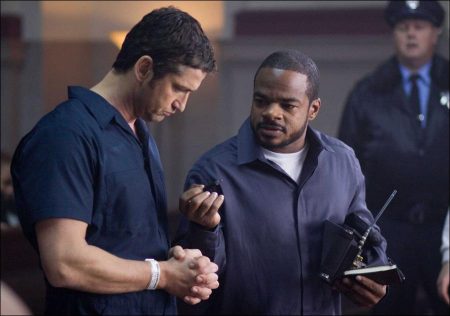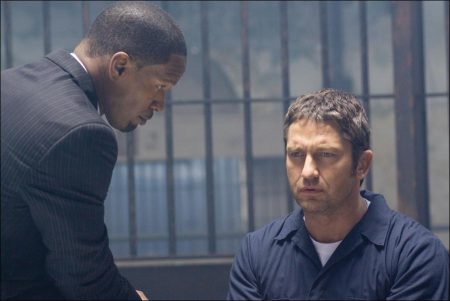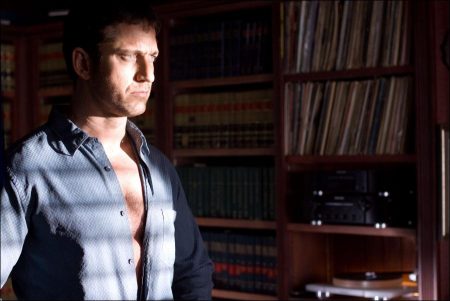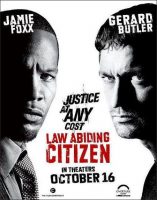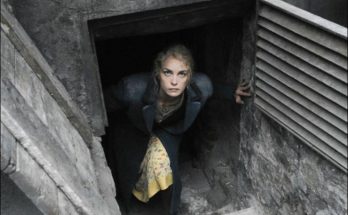Tagline: Justice at any cost.
Law Abiding Citizen movie storyline. Clyde Shelton (Gerard Butler) is an upstanding family man whose wife and daughter are brutally murdered during a home invasion. When the killers are caught, Nick Rice (Jamie Foxx), a hotshot Philadelphia prosecutor, is assigned to the case. Nick offers one of the suspects a light sentence in exchange for testifying against his accomplice.
Fast forward ten years. The man who got away with murder is found dead and Clyde Shelton coolly admits his guilt. Then he issues a warning to Nick: Either fix the flawed justice system that failed his family, or key players in the trial will die.
Soon Shelton follows through on his threats, orchestrating from his jail cell a string of spectacularly diabolical assassinations that can be neither predicted nor prevented. Philadelphia is gripped with fear as Shelton’s high-profile targets are slain one after another and the authorities are powerless to halt his reign of terror. Only Nick can stop the killing, and to do so he must outwit this brilliant sociopath in a harrowing contest of wills in which even the smallest misstep means death. With his own family now in Shelton’s crosshairs, Nick finds himself in a desperate race against time facing a deadly adversary who seems always to be one step ahead.
About the Production
Gerard Butler, the star and one of the producers of Law Abiding Citizen, has starred in the CGI-enhanced blockbuster 300, the film adaptation of the Broadway phenomenon The Phantom of the Opera and Guy Ritchie’s most recent crime epic RocknRolla, but he says this film is a standout for him. “I don’t recall ever working on a movie that has gotten me so excited,” says Butler. “I feel like its themes are quite profound in some ways and should make us think about how lucky most of us are.”
Law Abiding Citizen follows Butler’s character, Clyde Shelton, a seemingly ordinary crime victim and Nick Rice, a Philadelphia prosecutor played by Oscar-winner Jamie Foxx, down a rabbit hole of violence and revenge, where nothing is as it seems and the law always is one step behind. Producer Lucas Foster worked with screenwriter Kurt Wimmer to develop the initial script. “The basic idea was that a man who had been betrayed by the system decided to teach the system a lesson-from inside jail,” says Foster. “We want to believe that when someone is arrested and they’re put into the system, that’s more or less the end of it. Whatever the outcome, proven innocent or proven guilty, that’s the end of the story. In our movie, it’s just the beginning.”
That unconventional starting point convinced Butler that Law Abiding Citizen was not a standard psychological thriller. “The story hit me in a way that most thrillers don’t,” Butler says. “In a lot of ways, it’s completely unexpected. You know right from the start that horrific events take place and you’re completely with one character. It is a very intense, scary story, yet at the same time you end up with empathy and emotion for both characters.”
The film also takes an incriminating look at the inconsistencies of an overloaded justice system. “The government is a great apparatus,” says Foster. “But sometimes it’s a broad sword when a scalpel is called for, especially in complicated matters like justice. “If I’m a regular person and this terrible tragedy happens to me, I have what I think is the normal redress,” he continues. “I go to the powers that be, believing I am going to get justice. Clyde Shelton doesn’t get justice and he makes a decision to take matters into his own hands. I’m sympathetic to him. If something that horrible happened to people I cared about, I would want justice for them however it came about. He’s doing what he thinks is right, what he thinks is honorable.”
The government is represented by Assistant District Attorney Rice, played by Jamie Foxx. “Nick Rice is almost a mirror image of Clyde Shelton,” says Foster. “He’s working within the system, but the system doesn’t always work well. That’s the moral dilemma he faces.”
“Rice’s commitment to the legal system sometimes gets in the way of his commitment to justice,” says Foxx, whose astoundingly versatile career has ranged from groundbreaking comedy performances on “In Living Color” to an Academy Award-winning portrayal of Ray Charles in Ray. “Sometimes the way the system works doesn’t allow him to get involved the way he wants. Nick’s a good man. He does everything by the law, but that doesn’t necessarily mean it’s the right thing ultimately. The system’s never going to be perfect, so he’s always trying to figure out how to maneuver in an imperfect world.”
Alan Siegel, Butler’s partner in the production company Evil Twins, learned about Law Abiding Citizen after reading Wimmer’s earlier script, Salt. “The script was terrific,” he says. “Kurt introduced himself at an awards ceremony where Gerry won an award for 300. I told him that Gerry and I were great fans and I asked if he had any other scripts. The next day he sent me Law Abiding Citizen and I read it immediately. That night I called Gerry and asked him to read the script because `Evil Twins might have its first film.’
“This movie explores our country’s flawed judicial system,” Siegel continues. “Both men want a more perfect system but each has a different threshold of how much he’s personally willing to sacrifice. Their resolve forces them to extremes that will leave audiences questioning if the end really does justifies the means. Law Abiding Citizen will be one of those rare films that will provoke debates after the credits roll.”
The producers (see page 8) selected F. Gary Gray to direct the film based on the strength of his previous work, which includes The Italian Job, The Negotiator, Be Cool and Set It Off. “We knew we wanted to work with him,” says Foster. “He continues to make really interesting movies. They’re all different in tone. What they have in common is complex characters. This movie required a very deliberate hand and he was the ideal filmmaker for this particular material.”
Since launching his career in the mid-1990s with the groundbreaking features Friday and Set It Off, Gray has developed a reputation as a director of great thoughtfulness and originality. “He’s very quiet,” says Foster. “But I could see the magic he was making. After watching the dailies, I was always amazed at the character development, and the visual development of the film. It was all in his brain from the beginning. He’s a master at what he does.”
Jamie Foxx has worked with some of Hollywood’s most acclaimed directors, including Oliver Stone, Sam Mendes and Michael Mann, but he had never done a film with Gray. The director remembers getting a phone call from Foxx that got the ball rolling.
“He called me and said, `I’m attached to this movie and I think you should get involved. It would be perfect for you,’” recalls Gray. “So I read the script and not only was it right up my alley, but I’ve wanted to work with Jamie for years and there couldn’t have been a more perfect project for us to start with.”
“Gary’s eye is incredible,” says Foxx. “Right off the bat, the movie looks epic because of the way he shot it, and not a lot of directors are able to do that. He’s able to work in larger-than-life proportions and make people want to give him the best they can on screen.”
Butler credits Gray’s passion for the project and non-stop energy for bringing the material to the screen under a great deal of pressure. “Gary came on board and gave life to the words on the page,” says Butler. “We had a great script, but the film is so much better. It’s exciting to look at. The drama comes across brilliantly and he got great performances from all the actors.”
The idea of a man who takes an entire city hostage from behind bars set Gray’s imagination to working overtime. “How can someone in jail instill that much fear? I thought about Al Capone running his syndicate from jail. I love a cool gangster flick and I also love a great thriller.”
With the opportunity to work with two gifted actors sweetening the deal, the project was irresistible to him. “This movie doesn’t fit into a normal Hollywood formula,” the director points out. “Normally you have an antagonist and protagonist. You can pretty much predict who they are and what they’ll do. This is a chess game with a twist that you would never expect.
“Nick Rice, the D.A., is on the side of the law, but he can be a jerk,” says Gray. “Clyde has been horribly victimized. Throughout the course of the movie, you’re constantly switching allegiances, and depending on the scene, you’re not really sure who to root for.”
Gray calls Foster a hands-on producer. “He definitely wants to be heard,” laughs Gray. “You might think that it wouldn’t be a good idea to put two such strong personalities in a room together, but we had a perfect relationship.
“The best thing about him as a producer was that he knew when to pull the reins tight and he knew when to let them loose,” the director continues. “I respect that. He definitely had a lot great ideas, and he’s someone who is strong in that way, but also creative and caring. I want someone like that on my team.”
Gray says Law Abiding Citizen combines all the elements that keep him excited about filmmaking. “Every day, I woke up with tremendous excitement about the possibilities that awaited me on set,” he says. “With a script like that, with actors and producers who allowed me to open up the material and improvise a bit, I felt like I had an opportunity to create something extraordinary.”
Co-producer Jeff Waxman promises that audiences will be riveted by what they see. “You’re on the edge of your seat from the beginning,” he says. “It’s absolutely gripping. From the minute it starts to the minute it’s over, you’ll be holding your breath and waiting to see what Clyde’s going to do next.”
Butler says Law Abiding Citizen gives him the same feeling that he had when he completed shooting 300. “It’s going to be a memorable experience for the audience. We have a great cast and it’s been brilliantly directed. Jonathan Sela, the cinematographer, has given it such a cool, distinctive look that just watching it is compelling enough. But on top of that, it has a story that turns everything you think you know on its head. It sneaks up and grabs you when you least expect it.”
For Foxx, the film’s appeal is simple. “This movie is going to be so attention-grabbing. Once it starts, the audience won’t know what to expect next and that’s going to keep them glued to their seats.”
Heroes and Villains
Lucas Foster, Gerard Butler and Alan Siegel began developing Law Abiding Citizen with the idea that Butler would play Nick Rice, the morally conflicted district attorney. During the development process, something changed for Butler. “I found that the more I was arguing for Nick, the more compelling Clyde became for me,” says the actor.
“One of the issues we always had with Clyde was the risk of him seeming to be a garden variety villain,” he continues. “But I thought, `he could be me, he could be you. How would we behave in that situation?’ I wanted audiences to understand his pain. You can laugh with him, you’re charmed by him, but you know inside he’s been destroyed. It was interesting to explore a character I could be terrified of and at the same time is a regular guy I could sympathize with.”
Clyde is the law abiding citizen of the title, an ordinary man whose life was changed forever by a random crime. “The one thing that Clyde is left with is at least he’ll have justice,” says Butler. “He puts all his hopes in Nick Rice and the system, thinking these two cads will be properly punished. When that doesn’t happen because Nick is more concerned with his career, Clyde is left abandoned in every way. He’s a lost soul. Unfortunately for everybody else, he has the talent and tenacity to ensure that the system that failed him is brought to its knees. Nobody who was involved in the original case is left untouched, especially Nick.”
Director F. Gary Gray describes Clyde as both a victim and a monster to some degree. “And still you have to ask yourself what you have would done,” he says. “Gerard Butler had an immense challenge with this character. Clyde represents the average person, but he acts out thoughts that most of us would never admit to in a million years, let alone act on. Gerard delivered a character who can live in two worlds.”
To prepare for the role, Butler spent time with criminologists, exploring the psychology of serial killers and revenge killers. “I also watched documentaries on killers and I did a good deal of research on the Internet,” he says. “It was enlightening for me.”
The role is another step in a deliberately diverse career for Butler. “When you look at the range of Gerry’s work, it’s extremely eclectic,” says Siegel, who also manages the actor. “He’s gone from romantic comedy to musical to drama to action adventure. And the characters are entirely different. After 300, he started to get recognized on the street, but it took a while before that happened, because his choices have been so unusual.”
Another equally commanding actor brings to life the film’s other sympathetic leading character. Standing on the opposite side of the scales of justice from Clyde is Nick Rice, the prosecutor played by Jamie Foxx.
“What I have always loved about this movie is how closely these two are bonded together,” Butler says. “They are like two warriors coming head-to-head. Despite the fact that they’re out to destroy each other, there’s a certain respect and understanding. One of the points that Clyde is making to Nick is that this could just as easily be him in the exact same situation.”
Lucas Foster agrees. “These two characters could easily switch places. They’re both complicated. They both are wrestling with morality. They’re both trying to achieve some kind of higher good. But the way they’re going about it is entirely different. I like movies that have complex characters. I don’t think straightforward `heroes’ reflect reality. Nick has done things that are of dubious morality. There are many shades of gray in the character. His objectives are honorable, but the way he goes about reaching them sometimes isn’t.”
Foxx joined the cast because he was intrigued by both the script and the people already committed to the film. “I know when I want to work with certain people,” says the actor. “I remember the feeling that I had when I saw 300. Gerard Butler was at the top of his game in that movie and I immediately wanted to do a film with him. On top of that, it’s a cool, interesting story.”
The actor came to the table with strong ideas about the development of Nick Rice’s character, recalls Foster. “Jamie had a huge influence on this movie. He spent a lot of time with the script. He saw Nick as someone who has lost his way, not at all a character who has to be handsome and heroic. Jamie really fought for the character to demonstrate genuine moments of frailty and weakness. For a lot of the movie, Nick is in the grip of something that is beyond his conception or control. Playing that required a lot of levels and Jamie brought them.”
Siegel agrees wholeheartedly. “Foxx’s contributions added depth to his character that enormously helped the film.“ He continues, “Jamie added a personality to his character that wasn’t written on the page and none of us had actually thought about. He plays Nick as a slick up-and-comer who has no problem working with the ineffective legal system because he desperately wants to climb the corporate ladder. Privately, he believes he’s acting ethically, but he soon discovers the error in his moral compass. At a pivotal point in the film, he must question his choices.”
Working with Foxx to flesh out the character was an enormous learning experience, says Butler. “In our previous drafts, Nick was a little flat. Jamie came in and just made him fly. His Nick is smooth, he’s charismatic, he’s intelligent, he’s witty, and he’s a good family man. It spreads the audience’s sympathy across the board. He’s just out there fighting the fight. But without a doubt, he does have a pretty big ego.
“Jamie brought all of those things,” the actor continues. “He’s so strong and powerful. It led to these intense, cerebral head-to-heads between our characters. Everything else in the movie is so entertaining I was concerned our scenes wouldn’t stand out, but they’re the heart of the movie.”
Foxx wasn’t afraid to reveal the personal flaws that helped create the volatile situation his character is faced with. “One of the things that Jamie brought to this project that nobody saw on the page was Nick’s arrogance,” says Gray. “If he starts off as a go-getter concerned about his own success, then, at the end, it’s a bigger and better arc and there’s more for him to play.”
Butler and Foxx rehearsed for several weeks before shooting to create and fine-tune the complicated connection between the two characters. “When Jamie and I got together on camera, a lot of magic happened,” says Butler. “A lot was said between the lines, as well. There’s so much in those scenes from the mano a mano combat to the game playing to the heartfelt truth.”
The pair managed to establish that dynamic tension without a great deal of shared screen time. “They’re only in five or six scenes together, but it is everything that we hoped it would be,” says Foster. “The sparks fly-talk about cat and mouse! They go back and forth, and it’s Jamie Foxx, the guy who won the Oscar® for Ray and Gerard Butler, who starred in 300! It’s quite a sparring match.”
Foxx met with both prosecutors and defense attorneys for insight into the criminal justice system. He came away viewing them as gladiators of the courtroom. “They have very different outlooks on justice,” he notes. “They have to fight it out every day in court and they have to have a tough skin. They can’t get bogged down with a lot of emotion.
“Most of the DAs I talked to were all about their conviction rates,” says Foxx. “Basically, that’s what my character’s about. He’s on his way up and there’s nobody he can’t convict. If he can’t convict them at trial, he’s going to make a deal, because he wants to keep those ratings up. He really looks at it like, `It’s the justice system and I’m the Michael Jordan of this.’”
As committed as Foxx was to creating a memorable and realistic character, he acknowledges that Clyde will be the audience’s touchstone. “They are going to live this movie through him, through his emotions, through his love for his daughter and his wife, and the anger that engulfs him. Justice is supposed to be served in a way that allows us all to sleep better at night, but sometimes it’s not enough.
“Anybody would have compassion for Clyde,” continues the actor. “A crazy chain of events turned his life upside down. He thinks, `How could this happen to me? I’m a good guy, I haven’t hurt anybody. I get up, I go to work, I go to church. I pay my taxes, so how could this happen to me?’”
The producers surrounded their two leading men with a cast of distinguished actors, including 2008 Best Supporting Actress Oscar nominee Viola Davis. The filmmakers were looking for a man to play the mayor of Philadelphia when Alan Siegel had an epiphany. “David Meister, my spouse, is a fashion designer who mentioned Viola Davis was among the stars he was dressing for the Screen Actors’ Guild Award ceremony. We were looking for a man, but why couldn’t the mayor be played by a woman? I saw her commanding performance in Doubt and knew she’d be perfect.”
The mayor’s scenes were scheduled to be shot in the middle of awards season, which made them difficult for Davis to fit into her busy schedule. “But we asked her to consider coming to Philadelphia to shoot these great scenes and she accepted enthusiastically,” says Siegel. “After her first day of shooting, the cast and crew gave her a tumultuous round of applause and I knew then that our movie was going in the right direction.”
In just a few minutes of screen time, Davis created a vivid portrait of a big city politician faced with a disastrous turn of events. “She came in and just killed it,” says Foster. “She blew everybody away on the set. We all ran around saying, `I’d better figure out how to do my job better, because she just made us all look like we should go back to school.’”
“She’s incredible,” says Foxx of Davis and her performance. “You almost want to take what she did and spin it off into a drama series on TV.”
Davis says she was attracted to playing the character’s power and authority. “I have to admit I could become addicted to coming on a set and controlling a bunch of testosterone-filled men. I can’t do it in my life. I had to fight the part of me that always wants to apologize after I yell at someone. I was fighting all the things that I’ve been taught about what girls and women should be.”
F. Gary Gray has plenty to say on the subject of Viola Davis, all of it good. “Viola makes the long sleepless nights and the coffee jitters all worthwhile. When you see a performance like hers, all the things you’ve gone through to make a movie are worth it. She is the truth. When she walks on the set, she’s power. That is the best way to describe it. She blows your expectations out of the water by delivering so much more.”
Davis was impressed with Gray’s assured grasp of both the technical aspects of filmmaking and the more delicate task of collaborating with actors. “I really like working with directors who have a vision and know what they want,” she says. “When I get to the set, I don’t want a director who says, `Well, just do what you feel. Have fun.’ I don’t want to do what I feel. I want the director to tell me what to do. After that, I can say, `I don’t want to do that,’ but at least I have something to work with. Gary had very strong vision of what he wanted in each character.”
Leslie Bibb, who plays Sarah, an assistant D.A. working with Nick Rice, echoes those feelings. “A director is like the dad of a set,” she says. “He’s the captain of the ship. It’s a lot of pressure. This movie was not for the faint of heart, but Gary knew what he wanted. I like specificity.”
At the start of Law Abiding Citizen, Sarah is just at the beginning of her career and Nick is her role model. “Sarah is where Nick was 10 years earlier,” says Siegel. “The system, little by little, takes her in. We begin to believe that she will take the same road Nick did.” Siegel adds, “Leslie is a very exciting young actress and the camera loves her.”
Bibb welcomed the chance to take on a character she describes as “a smart, gutsy woman.” “Sarah idolizes Nick, but she has a real crisis of conscience and starts to question his choices,” says Bibb. “I think that, in the beginning, she would do anything Nick wanted her to do, but her journey starts when she wonders if they could have made a very wrong decision. When she thinks about it, was it worth the deal?
“It’s a provocative movie,” she observes. “People are going to leave the theater and talk about it at length. There is no cut-and-dry, black-and-white, yes-or-no answer.”
Bibb considers herself fortunate to have played all of her scenes with Foxx. “Jamie is a great actor,” she says. “I always get excited when I meet somebody that I really respect as an actor and he’s a good egg. He makes me laugh and he’s so unbelievable at doing impersonations. When you spend 16 hours a day with someone, you have to hope they’re good people.”
Colm Meaney and Michael Irby bring very different histories to their portrayals of two police officers who work alongside Nick in battling Clyde. “Colm Meaney is just fun,” says Gray. “I looked forward to working with him every day. With his experience and background, he brought a lot to the character. You felt his presence.”
The distinguished actor, whose roles have ranged from the Irish indie comedy The Snapper to “Star Trek: Deep Space Nine,” is an enthusiastic fan of the script. “It was a real page turner,” Meaney says. “Reading it was like picking up a good book. From the opening page, it sent me straight into this shattering world. I read it in one sitting.
Meaney’s character, Detective Dunnigan, is an old school, no-nonsense cop who wants to get to the truth by any means necessary. “He would be very happy to waterboard people if that worked,” says the actor. “Nick, on the other hand, is trying to figure this out in a reasonable way.”
Realistic characters, riveting drama and great performances set Law Abiding Citizen apart from other action movies and thrillers, says Meaney. “Jamie has a wonderful, hip, street thing going on, along with a ferocious intellect as the D.A. This guy knows the law and knows people. It’s wonderful to see those two things co-exist in a character.”
Michael Irby is familiar to television viewers for his role on “The Unit.” “At my house, we watch “The Unit” religiously,” says Foster. “When we were talking about someone to play Detective Garza, we knew him to be a very honest, grounded actor. We wanted these cops to feel like real cops who deal with death and mayhem all the time.”
Irby’s gravitas keeps every scene he is in real, says Gray. “I’m all about chemistry and Michael was always the perfect ingredient to balance the scene. It’s a gift for a director to have an actor who can bring more to a role than what’s on the page.”
Irby says he drew a lot of positive energy from the director. “Gary is fired up!” he says. “He gave us little things to think about at the beginning of the take. He definitely knows what he wants and as an actor, you just want to give it to him. Everybody brought their A-game.”
Rounding out the cast is Bruce McGill as Jonas Cantrell, the District Attorney, Nick’s boss and mentor. Gray knew McGill from a television pilot they did together. “We always said we would work together again.”
That experience accounts for McGill’s unwavering trust in Gray’s cinematic vision. “I looked in his eyes and I could see that he had the movie in his head,” says the actor. “He just had to shoot it. It’s a very specific genre-a suspense thriller with pyrotechnics and major stars. Gary knows the process really well.”
Bruce McGill also worked with Foxx previously in the films Collateral and Ali. “I’m a big Jamie Foxx fan,” says McGill. “I really admire him and I have for a long time. He brought incredible energy all day, every day.
“What’s important in my character is the relationship with Jamie,” he says. “It starts out very paternal, very nurturing. They have a warm, long-time relationship and it’s not just boss and underling. But it’s just such an ugly world and things change. The body count begins.”
A Look at “Neo-Noir” Philadelphia
A quintessentially urban story, Law Abiding Citizen needed the backdrop of a great American city for its intricately woven tale. Originally set in Los Angeles, the events of the story took on special significance when the setting was changed to Philadelphia. “It was a very specific choice on our part,” says producer Lucas Foster. “It’s the seat of English common law in America. The Founding Fathers spent a lot of time there. This movie is all about justice, so it made a lot of sense for us to come to the place where a lot of these issues were first considered.”
The city offered the filmmakers several unique attributes, says Foster. “It has amazing architecture. It feels big, but not impersonal. It feels like a place where you know you can get a little bit lost.
“It was also important to us to have a place that was graphically stark and unusual,” he adds. “We’re calling the look of this movie `neo-noir.’ I don’t think Philadelphia has ever been photographed the way we’re photographing it.”
Philadelphia’s iconic City Hall, whose singular silhouette has been one of the defining images of the Philadelphia skyline for more than a century, figures prominently in the action. “Philadelphia City Hall is one of the most beautiful buildings I’ve seen in America,” says Butler. “It has so many great views and angles that no matter where you are it looks amazing. We lit up the whole street leading down to City Hall one night and it took my breath away.
“When you come to such a big city, you can feel that you’re just going to be a drop in the ocean, but you’re not in Philadelphia,” the actor says. “The city was really excited to have us here, and I was charmed by Philadelphia. I would make another movie here in a heartbeat.”
For critical scenes that take place behind prison walls, the filmmakers secured a notorious location. Holmesburg Prison was closed in 1995 after riots killed two wardens, but it may be better known as the site where infamous medical experiments were performed on prisoners. Built in 1896, and recently partially reopened to house overflow from other prisons, Holmesburg is the antithesis of a modern prison with its crumbling brick walls, archaic structures and rusting cells.
“Holmesburg is almost medieval,” says Foster. “You’re transported to another era. This movie could take place almost at any time if you didn’t see modern vehicles in it. It could be a ’40s movie, this could be The Big Sleep, and Holmesburg really lent itself to that timeless feeling.” Shooting in Holmesburg proved to be a powerful experience for Butler. “We were in a functioning prison,” says the actor. “I’m not somebody who’s used to jails, just as Clyde Shelton isn’t. While we were filming, we’d have to stop so inmates in shackles could be led through by guards, and then we would start filming again. It was a fascinating experience, right down to the smell and the cold. The place tells a whole story unto itself.”
F. Gary Gray worked closely with the film’s production designer, Alex Hajdu, to develop a signature visual style for Law Abiding Citizen that takes its inspiration from the city and reflects some of the story’s complexity. “The premise of the movie dictated a unique style,” says the director. “We took some of the classic elements of film noir and introduced them into a very modern movie. We were not afraid to grab the long shadows or use high contrast. I thought that was perfect given the subject matter.”
Philadelphia itself helped define movie’s look, according to Hajdu. “I drew a sense of color and mood from the city. The architecture and scope of the buildings translated into a visual style for me. Philadelphia is fantastic in that respect. It has a lot of history and a lot of texture. Because it’s an older city, it has an almost European color palette. There are a lot of brick and earth tones, which worked well for the muted palette of film noir.”
Seeing his vision so painstakingly realized was gratifying for Gray. “It’s one thing to dream up this world,” he says. “It’s another to have a creative partner who has the ability to fulfill the dream with his own great ideas incorporated. Alex was a soldier. He’s a storyteller who understands how to visually deliver a world.”
Gray credits two more key members of the production team with helping create the atmosphere he envisioned for the film. “Our director of photography, Jonathan Sela, is a rock star. He’s a quiet guy, but he’s deadly. I don’t think I could have delivered this style of movie without his understanding. I told him I wanted a throwback to the classic noir pictures and he got it right away. He had great ideas for creating that concept.”
Wardrobe also had to fit Gray’s rigorous criteria. “Jeffrey Kurland, our costume designer, took the concept of neo-noir and ran with it,” says the director. “He is a true artist. I’ve never worked with a costume designer who nailed a specific concept like this. He also makes the actors feel good, which makes my job easier because when they’re confident, they can deliver their best performances.”
Gray’s innate understanding of the importance of visuals made the production designer’s job challenging and rewarding. “Working with Gary was a remarkable experience,” says Hajdu. “It’s easy to discuss concepts with him. He took nothing at face value. He pushed to find aspects of this film that didn’t appear on the page and uncovered all the hidden gems that he could. We spent hours with the cinematographer, laying out this movie in great detail, so we knew where we were all going together.”
Every film has unique challenges, says Gray. “But I really enjoyed making this movie and I think a lot of that has to do with the concept. This is the most fun I’ve had on a movie and it has helped me grow as a filmmaker. I’ve delivered very entertaining movies in the past, but I think this is a kind of next chapter. When audiences watch Law Abiding Citizen, I don’t think they’re going to be prepared for the movie they’re going to see. It’s going to continuously surprise them.”
Law Abiding Citizen (2009)
Directed by: F. Gary Gray
Starring by: Gerard Butler, Jamie Foxx, Viola Davis, Bruce McGill, Leslie Bibb, Colm Meaney, Regina Hall, Michael Irby, Christian Stolte, Annie Corley, Richard Portnow, Josh Stewart
Screenplay by: Kurt Wimmer, Frank Darabont, David Ayer
Production Design by: Alex Hajdu
Cinematography by: Jonathan Sela
Film Editing by: Tariq Anwar
Costume Design by: Jeffrey Kurland
Set Decoration by: Chryss Hionis
Art Direction by: Jesse Rosenthal
Music by: Brian Tyler
MPAA Rating: R for strong bloody brutal violence and torture, a scene of rape, and pervasive language.
Distributed by: Overture Films
Release Date: October 16, 2009
Views: 97
